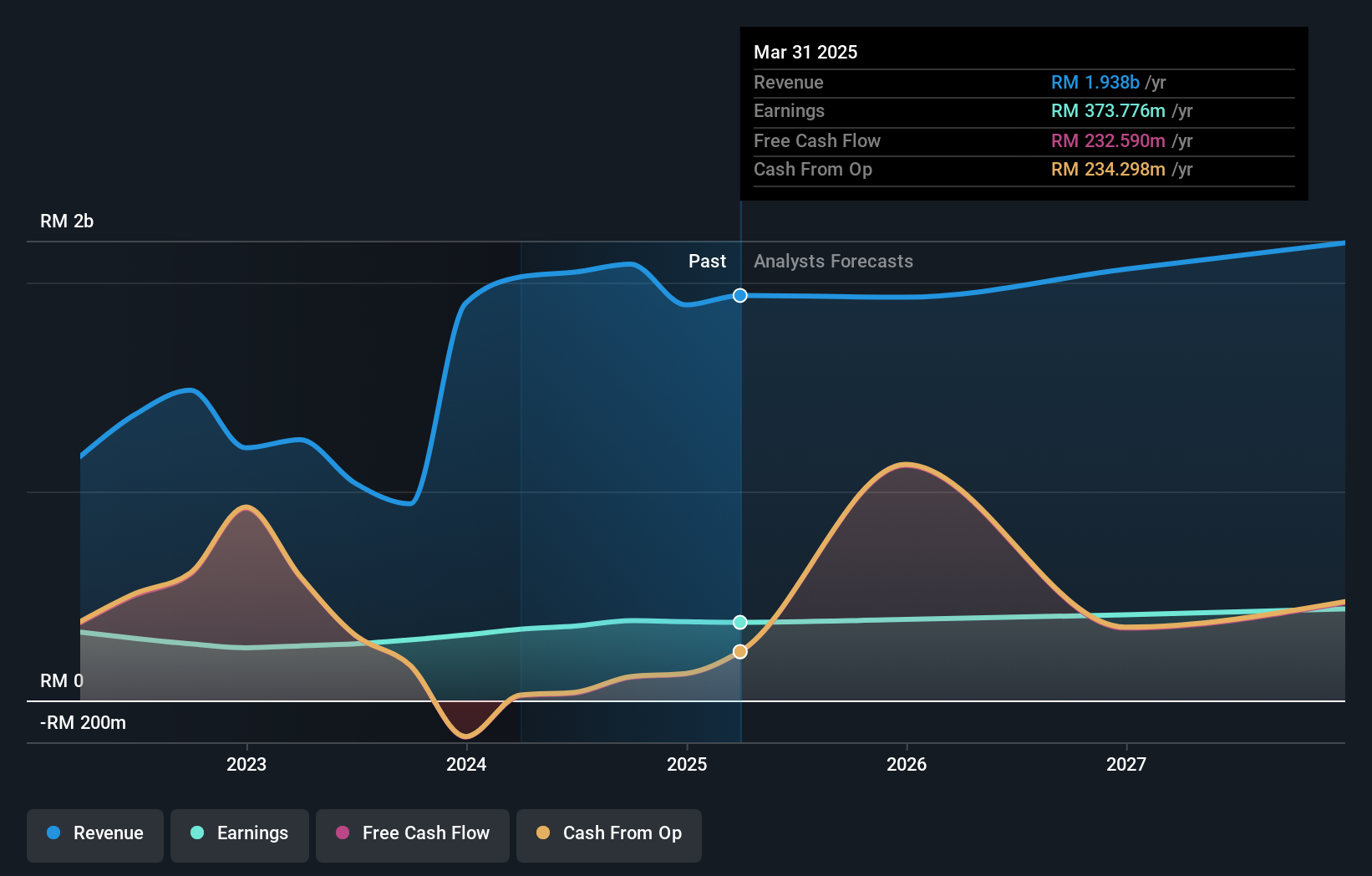Institutional owners may ignore LPI Capital Bhd's (KLSE:LPI) recent RM287m market cap decline as longer-term profits stay in the green
Key Insights
- Given the large stake in the stock by institutions, LPI Capital Bhd's stock price might be vulnerable to their trading decisions
- Public Mutual Bhd. owns 54% of the company
- Using data from analyst forecasts alongside ownership research, one can better assess the future performance of a company
If you want to know who really controls LPI Capital Bhd (KLSE:LPI), then you'll have to look at the makeup of its share registry. And the group that holds the biggest piece of the pie are institutions with 73% ownership. That is, the group stands to benefit the most if the stock rises (or lose the most if there is a downturn).
No shareholder likes losing money on their investments, especially institutional investors who saw their holdings drop 4.8% in value last week. However, the 24% one-year return to shareholders may have helped lessen their pain. But they would probably be wary of future losses.
Let's delve deeper into each type of owner of LPI Capital Bhd, beginning with the chart below.
View our latest analysis for LPI Capital Bhd

What Does The Institutional Ownership Tell Us About LPI Capital Bhd?
Institutions typically measure themselves against a benchmark when reporting to their own investors, so they often become more enthusiastic about a stock once it's included in a major index. We would expect most companies to have some institutions on the register, especially if they are growing.
We can see that LPI Capital Bhd does have institutional investors; and they hold a good portion of the company's stock. This suggests some credibility amongst professional investors. But we can't rely on that fact alone since institutions make bad investments sometimes, just like everyone does. If multiple institutions change their view on a stock at the same time, you could see the share price drop fast. It's therefore worth looking at LPI Capital Bhd's earnings history below. Of course, the future is what really matters.

Investors should note that institutions actually own more than half the company, so they can collectively wield significant power. We note that hedge funds don't have a meaningful investment in LPI Capital Bhd. Public Mutual Bhd. is currently the company's largest shareholder with 54% of shares outstanding. This implies that they have majority interest control of the future of the company. With 8.5% and 4.7% of the shares outstanding respectively, Sompo Asset Management Co., Ltd. and Public Bank Berhad, Group Officers Retirement Benefits Fund are the second and third largest shareholders.
While studying institutional ownership for a company can add value to your research, it is also a good practice to research analyst recommendations to get a deeper understand of a stock's expected performance. Quite a few analysts cover the stock, so you could look into forecast growth quite easily.
Insider Ownership Of LPI Capital Bhd
The definition of company insiders can be subjective and does vary between jurisdictions. Our data reflects individual insiders, capturing board members at the very least. The company management answer to the board and the latter should represent the interests of shareholders. Notably, sometimes top-level managers are on the board themselves.
I generally consider insider ownership to be a good thing. However, on some occasions it makes it more difficult for other shareholders to hold the board accountable for decisions.
We can see that insiders own shares in LPI Capital Bhd. It is a pretty big company, so it is generally a positive to see some potentially meaningful alignment. In this case, they own around RM183m worth of shares (at current prices). Most would say this shows alignment of interests between shareholders and the board. Still, it might be worth checking if those insiders have been selling.
General Public Ownership
With a 22% ownership, the general public, mostly comprising of individual investors, have some degree of sway over LPI Capital Bhd. While this size of ownership may not be enough to sway a policy decision in their favour, they can still make a collective impact on company policies.
Next Steps:
It's always worth thinking about the different groups who own shares in a company. But to understand LPI Capital Bhd better, we need to consider many other factors. Consider for instance, the ever-present spectre of investment risk. We've identified 2 warning signs with LPI Capital Bhd (at least 1 which is concerning) , and understanding them should be part of your investment process.
But ultimately it is the future, not the past, that will determine how well the owners of this business will do. Therefore we think it advisable to take a look at this free report showing whether analysts are predicting a brighter future.
NB: Figures in this article are calculated using data from the last twelve months, which refer to the 12-month period ending on the last date of the month the financial statement is dated. This may not be consistent with full year annual report figures.
Have feedback on this article? Concerned about the content? Get in touch with us directly. Alternatively, email editorial-team (at) simplywallst.com.
This article by Simply Wall St is general in nature. We provide commentary based on historical data and analyst forecasts only using an unbiased methodology and our articles are not intended to be financial advice. It does not constitute a recommendation to buy or sell any stock, and does not take account of your objectives, or your financial situation. We aim to bring you long-term focused analysis driven by fundamental data. Note that our analysis may not factor in the latest price-sensitive company announcements or qualitative material. Simply Wall St has no position in any stocks mentioned.
 Wall Street Journal
Wall Street Journal